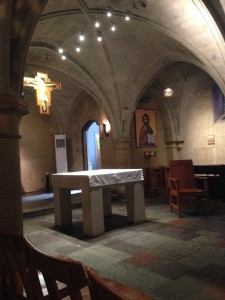Mass
I went to my first evening Mass last night at 10 PM. On a weeknight, I’m usually in bed by then so I hope God gives me extra points for my good deed.
I’m glad I did. It was energizing, and a nice way to cap off the night.
This particular Mass is held over at Georgetown and is more directed to students, which is why it is held at 10 PM; students have weird schedules.

I was surprised at the number of people that came. I estimate there were probably 30 students and a handful of non-students that participated. Prior to the start of this project, I would have thought these kids were weird/nerdy for going to Church on a weeknight.
During Mass, I realized how great it was that these students were going to dedicate their time to learning positive virtues and thinking about how to apply it to their life.
For example, the priest asked us to think about suffering. Everyone goes through periods of suffering and difficulty, but he told us that when we are suffering, we should think about how Jesus suffered. And not just suffered, but suffered for us out of love. And like Jesus’ suffering, our suffering will eventually end.
“And this too shall pass.”
I could think of worse ways to spend a Tuesday night.
Spiritual Exercise
I lucked out yesterday; the passage I was supposed to reflect on was the 23rd Psalm, which I know [mostly] by heart.
The Lord is my shepherd, I shall not want.
He makes me lie down in green pastures; he leads me beside still waters;
he restores my soul.
He leads me in right paths for his name’s sake.
Even though I walk through the darkest valley, I fear no evil; for you are with me; your rod and your staff—they comfort me.
You prepare a table before me in the presence of my enemies; you anoint my head with oil; my cup overflows.
Surely goodness and mercy shall follow me all the days of my life, and I shall dwell in the house of the Lord my whole life long.
The exercise asked us to consider “what words or images move me?”
I really like the metaphor of the Shepherd (and us being sheep) and the rhythm of the poem. It starts off with a very peaceful scene, leads your through the “darkest valley,” sits you down to a meal with your enemies, and then ends with a beautiful image of serenity.
It’s ironic that I enjoy this poem about being guided by a shepherd because I try really hard not to be “sheeple.
My personality type is such that I’m constantly poking holes in other people’s ideas or pointing out the absurdity of doing work that is pointless.
I like this about myself. It allows me to look at things in a different way than others and direct people to ways of thinking that could help them improve.
There is a downside though: it’s exhausting!
Always having to find your own way of doing things, being on the lookout for any attempt by others to brainwash you, and constantly trying to outsmart yourself are just some of the activities that leave in a comatose state on the couch.
It also makes it difficult for me to trust other people. It’s not that I believe others have malicious intent, it’s more like any advice they give me has to go through a rigorous analytical process in my brain before I can believe it. I trust myself more than I trust anyone else.
What’s funny is it works the other way too. For some reason people ask me for advice on various topics. I share my thoughts, they thank me, and I wonder why they believe what I say! I’m skeptical about others’ lack of skepticism.
As I write this, my mind is already working against me. It tells me that my post sounds like self-indulgent drivel, that I’m just trying to be like the angsty teenager on a TV show who never learned to trust anyone do to his tough childhood. It is telling me that I should be more Stoic, or celebrate my independent mind and become an Ayn Rand hero.
When I was reflecting on the 23rd Psalm I thought about how great it would feel to implicitly trust someone, to have a friend/guide/mentor watching out for your best interests. To have someone just take away your burdens and worries and direct you to where you need to go.
My mind still can’t get to the point where I “trust God” or “trust Jesus;” it is still too foreign to me.
But the Ignatian Exercises act as a form of therapy. By thinking about the stories in the Bible and paying attention to where you mind and feelings wander, you start to get a sense of what your deeper needs are and where they aren’t being met.
I don’t “believe” anything yet, but I do feel like I’m already benefiting from the deep reflection the spiritual exercises require.